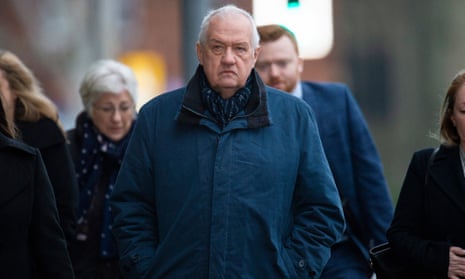The former South Yorkshire police chief superintendent David Duckenfield has been found not guilty of gross negligence manslaughter more than 30 years after he commanded the police at the 1989 FA Cup semi-final at Hillsborough between Liverpool and Nottingham Forest, at which 96 people died.
The verdict came in a retrial at Preston crown court that began on 7 October. A first trial on the same charge, heard by the same judge, Sir Peter Openshaw, ended on 3 April with the jury unable to reach a verdict.
Duckenfield was charged in June 2017 after a new police investigation into the disaster, Operation Resolve, and verdicts of unlawful killing returned by the jury in an inquest in 2014-16 in Warrington.
After the verdict, at a press conference in the Cunard building in Liverpool where relatives of the victims had been watching the proceedings via a relay, Margaret Aspinall, the chair of the Hillsborough Family Support Group, said: “I blame a system that’s so morally wrong within this country, that’s a disgrace to this nation.”
Aspinall, whose 18-year-old son James was among those killed, said: “When 96 people – they say 95, we say 96 – are unlawfully killed and yet not one person is accountable. The question I’d like to ask all of you and people within the system is: who put 96 people in their graves? Who is accountable?”
The original 1991 inquest verdict of accidental death was quashed 21 years later after a long campaign by bereaved families.
The jury in Preston heard that the lethal crush developed in the central “pens” 3 and 4 of the Leppings Lane terrace after a buildup of people at the turnstiles with tickets to support Liverpool.
Owing to the selected method of keeping the two clubs’ supporters separate, only the 23 turnstiles at the Leppings Lane end were used to process all 24,000 people with tickets for the north and west stands allocated to Liverpool. Of these, only seven turnstiles were available for all 10,100 people with tickets to stand on the Leppings Lane and north-west terraces.
Duckenfield had been promoted by South Yorkshire police to chief superintendent 19 days before the semi-final and had never before commanded a match at Hillsborough. The experienced previous chief superintendent, Brian Mole, had been moved to command the division at Barnsley.
The court heard that at the match on 15 April 1989, a backlog built up at the turnstiles after the police, under Duckenfield’s command, did not manage fans’ approach with filters or cordons. No successful measures were taken to alleviate the crush that developed after 2.30pm.
At 2.47pm, Supt Roger Marshall, on duty at the turnstiles, requested the large exit gates to be opened to allow people respite. Duckenfield declined. At 2.52pm, Marshall warned that somebody would die if the gates were not opened. Duckenfield then gave the order to open the gates.
Gate C opened on to a concourse with a tunnel directly ahead, leading to the central pens. Many of approximately 2,500 people who came through gate C, including 30 of the people who were killed, went down the tunnel. The prosecution alleged that Duckenfield’s failure to identify hazards at the turnstiles, monitor the numbers waiting to come in, relieve the pressures outside, monitor the numbers in the central pens and direct people away from the tunnel and central pens amounted to gross negligence.
Duckenfield pleaded not guilty, arguing that the disaster was caused by other factors including historic safety flaws of Sheffield Wednesday’s stadium itself, and failings by some of the other police officers. His barrister, Benjamin Myers QC, pointed to Duckenfield’s inexperience as a match commander and argued he was being held to a higher standard than others.
Duckenfield was charged in relation to only 95 of the people who died. The 96th victim, Tony Bland, was critically injured in the crush and died in 1993 after life support was lawfully withdrawn. According to the law in 1989, a criminal charge relating to a death could not be brought if the victim died longer than a year and a day after the acts that allegedly caused it.
Relatives of seven of the 96 people killed were in the public seats in Preston, and many more watched in Liverpool. They were very distressed and have consistently asked how there could be an unlawful killing verdict at the inquests but a not guilty verdict in the prosecution.
About 45 family members watched the verdict from the Cunard building. There were shouts in the room as it was announced.
Christine Burke, whose father, Henry Burke, 47, was killed in the crush, stood up sobbing and cried out to the judge that, as 96 people were unlawfully killed, “I want to know who is responsible for the death of my father, because somebody was.”
Openshaw did not respond, turned to the Crown Prosecution Service (CPS) barrister Christine Agnew QC and said there were “matters to sort out”, and the court was cleared.
Sue Hemming, the CPS director of legal services, said: “The disaster at Hillsborough 30 years ago has caused unimaginable suffering to the families of those who sadly lost their lives and to everybody affected by the tragic events of that day. They were let down with the most catastrophic consequences imaginable. I know how important these proceedings have been to everyone, even though they came far too late.
“The events of 15 April 1989 have been considered on a number of occasions, including at the second inquest concluding in 2016. It is important to remember that criminal proceedings have a very different purpose to an inquest.
“The not guilty verdict today does not affect or alter the inquest jury’s findings of unlawful killing or their conclusion that Liverpool fans were in no way responsible for the 96 deaths that resulted.”
